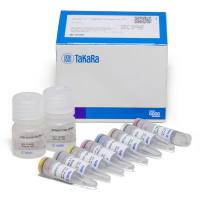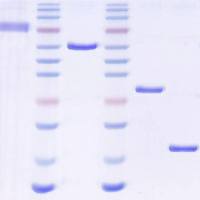Protein Interaction Cloning by Far-Western Screening of -Phage cDNA Expression Libraries
互联网
549
One of the most powerful ways to gain novel insights into a particular protein’s cellular functions is to identify other proteins with which it specifically interacts. Traditionally, this problem has been approached by use of protein biochemistry, involving purification of interacting proteins and determination of at least a portion of their amino acid sequences by microsequencing techniques, so that degenerate oligonucleotides can be prepared and cDNAs obtained by conventional hybridization screening of cDNA libraries. This biochemical approach, however, is an enormously laborious task, and in the vast majority of cases, the yields of protein are simply inadequate to make it feasible. As an alternative, cDNAs encoding interacting proteins can be obtained by direct screening of λ-phage cDNA expression libraries using recombinant proteins and methods similar to those developed for antibody-based screening. This expression cloning approach is based on the “far-western” method (also known as ligand blotting or West-Western) in which proteins immobilized on nitrocellulose or other suitable membranes can be detected by their ability to bind to soluble recombinant proteins of interest (1 –6 ). These protein-protein interactions are conceptually similar to traditional antigen-antibody interactions involved in Western blotting, but typically occur with lower affinity.









